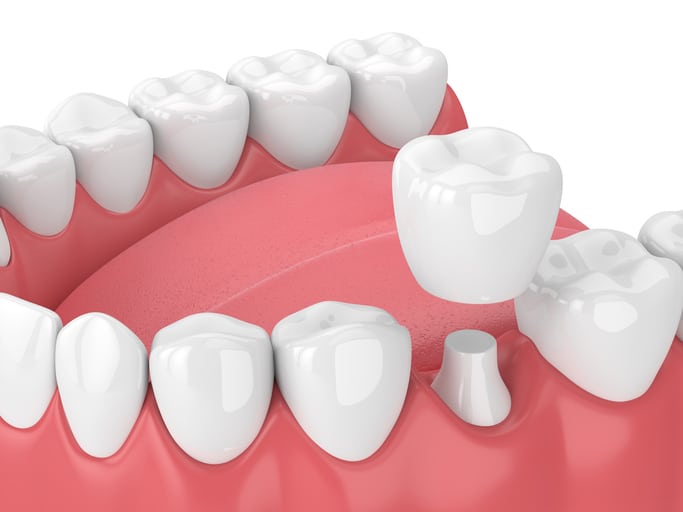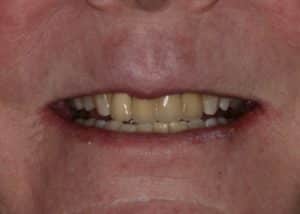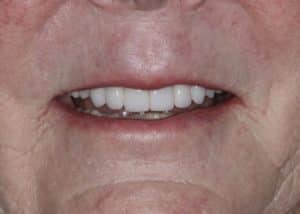

Sometimes a damaged tooth doesn’t have enough healthy mass to support a new filling or other repair — it’s in danger of needing extraction, which is usually the last resort. Or the tooth may have a deep crack or chip. In these cases, placing porcelain crowns over the tooth or teeth in question can save the tooth and restores strength and function.
In most dental practices it takes two appointments to place a dental crown. At McDowell Dental Group, we can prepare the tooth, create the crown, and place it all in just a single visit, thanks to our CEREC technology.
If you are interested in porcelain crowns in Rydal PA, Jenkintown PA and surrounding areas, contact us today to schedule and appointment.
What Is A Dental Crown?
You may have an older relative who has referred to his or her “caps.” This was the term used for a dental crown when they were predominantly made from gold. The gold cap could be said to look like a cap placed over the tooth. That moniker isn’t a bad way to think about porcelain crowns. A dental crown covers the entire visible portion of the tooth above the gumline. To make room for the dental crown, the remaining portions of the natural tooth are shaved down on all sides and on top. This allows the crown to occupy the same space as the original natural tooth.
In addition to saving a heavily damaged tooth, porcelain crowns are used as the anchors for dental bridges. They are placed on the teeth on each side of the gap.
While some dentists use crowns made from various materials, at McDowell we only use porcelain crowns — we believe they provide the best combination of strength and appearance. Plus, we can mill them right in our Abington offices with our CEREC system. This adds a level of convenience for our patients.
When Is A Porcelain Crown Needed?
The purpose of a dental crown is to restore the strength in a tooth. Porcelain crowns are excellent options for the following problems:
- Chipped teeth
- Broken or fractured teeth
- Teeth with large fillings
- Severely worn teeth
- Misshapen teeth
- Severely discolored teeth
- Teeth that have had a root canal
- Teeth with fractured fillings
- The teeth on both sides of a bridge

Who Is A Good Candidate For Dental Crowns?
There are several reasons you may need a dental crown. Dr. McDowell or Dr. Ashley will discuss your situation with you after your dental exam. Dental crowns are necessary when a tooth has sustained a fair amount of damage. As much as possible, we try to repair the damage using a filling or smaller restoration. Crowns are full-coverage. They are used for problems like broken teeth and severe decay, and to protect a tooth after root canal therapy.
Are Dental Crowns Permanent?
Dental crowns are not permanent restorations. The fit of a crown may change over time based on gum health and other factors. A crown can also suffer wear and tear. That said, CEREC porcelain crowns have been known to last over 20 years. If you take good care of your teeth and gums, you can expect your crown to be a long-lasting solution.
Are There Any Foods Or Drinks I Should Avoid After Receiving Porcelain Crowns?
The fit and bond of your new CEREC crown will be remarkably accurate. This allows you to eat nearly anything you wish! Because crowns can degrade and sustain damage from hard objects, it is recommended to refrain from chewing on ice, pen caps, and other items. Foods that are very chewy can also create problems for dental crowns because of the way that their stickiness pulls upward against the bond. Besides being careful with very hard and very chewy foods, your diet should be able to remain the same as it always has been.
Are There Any Side Effects From Porcelain Crowns?
You may experience short-term side effects from getting a new crown. The most common ones include minor soreness or tenderness in the area around the tooth and temporary sensitivity to hot or cold. You might take an over-the-counter pain reliever to alleviate these symptoms. Once the nerves beneath the tooth have settled from the minor inflammation caused by the crown process, you should regain full comfort.
Is The Dental Crown Procedure Painful?
No. It does not hurt to get a dental crown because your dentist administers efficient local anesthesia before beginning the repair process. After the anesthetic wears off, you may experience slight discomfort. Talk to your dentist about when you can take an over-the-counter pain reliever to prevent pain. Taken as directed, a mild analgesic should work wonderfully to maintain comfort until your side effects subside.
What Is The Process For Receiving A Dental Crown?
Once Dr. McDowell or Dr. Ashley discuss with you the need for a dental crown on your damaged tooth, we then prepare the tooth. This means removing any decay or damaged tooth material. Next, the tooth is shaved down on all sides and the top to create room for the crown to cover the tooth. We then take measurements and photos that will be used to create your crown. This information is sent to our CEREC system. The software allows us to design your crown in 3D right on screen next to where you’re sitting. Once the crown is designed, we send the information to our milling machine, which takes a block of dental porcelain and begins milling your tooth. It only takes about 30 minutes to create our porcelain crowns.
Where your crown is finished, we place it on the prepared tooth. First, we check the color match with your adjacent teeth and then we check the fit. If necessary, we may shave down an edge here or there. Once we both agree the fit is perfect, we cement the dental crown onto your tooth permanently and you’re good to go.
FAQs About Porcelain Crowns
Porcelain crowns provide the perfect combination of strength and appearance. With proper care, porcelain crowns can last for decades, and because porcelain allows the light to reflect in a manner similar to your natural tooth enamel they are aesthetically superior. Fully porcelain crowns also don’t include mercury or other toxic metals.
Porcelain crowns are doubly reinforced by bonding agents and cement. Whereas PFM (Porcelain Fused to Metal) crowns only use cement to adhere to the tooth, porcelain crowns have the added bonding agent to make them stronger and last longer.
There is no recovery after your dental crown is placed. You may have some residual feeling from the anesthesia we used when preparing your tooth for the crown, but that quickly dissipates. Otherwise, you can use your new crowned tooth immediately.
Porcelain crowns can last for decades, but their endurance is often tied directly to your home hygiene. After all, the porcelain won’t decay, but the tooth underneath it still can. Other bad habits such as chewing ice and biting your fingernails can shorten the lifespan of a crown.
Porcelain crowns are basically life preservers for heavily damaged teeth. Without a crown, the damaged tooth will probably need to be extracted. It won’t be strong enough to handle biting and chewing once the damaged/decayed portion is removed. So, if you want to keep the tooth, a crown is the only option. If you want to extract the tooth, you can replace it with a dental implant or a bridge.
Porcelain veneers are only cosmetic improvements to teeth. The veneers are placed onto the front of the tooth or teeth, improving their appearance. Porcelain veneers are only cosmetic, however, and they don’t do anything to strengthen the tooth. Any decay or damage needs to be addressed before a tooth can get a veneer. Also, veneers usually only last 10-15 years.
Porcelain crowns cover the entire tooth. They not only make the tooth look perfect, but they also return function. So, porcelain crowns are cosmetic and functional. Porcelain crowns can last for decades, often the remainder of the person’s life.
Dental Crowns Before & After Images




If you are interested in porcelain crowns in Rydal, Jenkintown, Horsham, Willow Grove, and Philadelphia, PA and would like additional information, please call our office at 215.885.0555 today to schedule a consultation!

